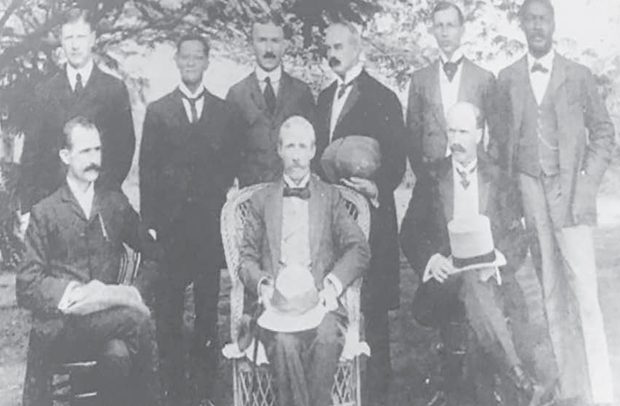Members of the Legislative Council in 1907. From left to right seated: Sir William Brandford Griffiths, Chief Justice, Sir John Rodger, Governor, Major H. Bryan, Colonial Secretary. Standing: A. Willoughby-Osborne , Attorney General, J.P. Brown, W.C. F. Robertson Secretary For Native Affairs , Extraordinary Members, C. Riby Williams, Treasurer, Giles Hunt, J. Mensah Sarbah
Incomes from the sale of cocoa accounted enormously for the growth of the local money economy more than any other resource especially towards the end of the nineteenth century in the Gold Coast. Making this observation in his book, ‘A Political History of Ghana 1850-1928’ David Kimble points out that ‘Overseas coins had been brought increasingly into use; but in 1880, foreign silver dollars, and in 1889 gold dust, were demonetized by Ordinance.’
It would be recalled, according to David Kimble, that the Mercantile Association in Cape Coast petitioned the Governor for an internal postal order system.
It was a certain Africanus Horton who established his own Commercial Bank of West Africa headquartered in Sierra Leone in 1882 with the intention of establishing branches in Cape Coast, Lagos, and Barthurst, now Banjul. Unfortunately, he died the year after.
Perhaps had he not died and went ahead with his ambitious project, the history of banking in West Africa would have been different from what is available today.
The Gold Coast News is reported to have stated that the creation of a commercial bank in the Gold Coast would be supported by the educated Gold Coasters. Perhaps this suggestion was informed by the position of others that the venture could not be sustainable at the time.
Latter developments especially the success story of the British Bank Of West Africa (BBWA) proved the newspaper right.
Two Gold Coasters were said to have spoken about the importance of the establishment of a bank in the Gold Coast. It was instructive that they spoke about a ‘sound bank’ not just any bank.
‘In our leading towns are men of large means, who, having no opportunity for investment, their money becomes unprofitable’ they said.
David Kimble’s reference to the BBWA is worthy of mention here and it reads ‘in 1894, the Bank Of British West Africa was founded, and given a monopoly of the import of British silver coin, a branch was opened in Accra in 1897, and one in Kumasi eleven years later’.
The circulation of British currency was on a rapid ascendancy and attracted the attention and envy of the governors of the British West Africa as they demanded of the profits.
The reply which came following their demand reads: ‘ My Lords, do not view with favour the proposal to take advantage of the predilection of African natives for silver coins as a means for passing an unlimited quantity of Imperial tokens into that continent.’
Internal exchange was enhanced when the colonial authorities introduced special nickel-bronze coins of various values.
There was an economic revolution in the Gold Coast as a result of the various developments which appeared to be coming with an uncontrollable speed.
The overseas investment in the mining sector supported the role of cocoa; the two joining to give the country an economic revolution as aforementioned.
Family members were soon not enough to work on the family farms hence the hiring of labourers – some of whom came from outside the production areas.
Various emoluments came into being. Emoluments came in the forms of labourers taking a certain quantity of the farm produce among others – in all though the workers were seasonal; returning to their places of origin when the season was over.
It was the payment of wages to the increasing number of workers coming to work in the mines which pushed further the demand for wages in the colony and therefore the need for coins.
‘During the construction of the first railway, it was reported that men were coming to Sekondi to seek work from many parts of the Colony, and even from farther afield,’ David Kimble stated.
In 1891, David Kimble mentions that an attempt was made to classify occupations in sixteen coastal towns including farmers and agricultural labourers, mechanics and civil servants.
In the 1911 census captured were farmers, labourers, clerks, carpenters, bricklayers and masons and engine drivers.
This was the dawn of cash as remuneration for workers. The mines needed more and more workers and the colonial authorities expanded the frontiers of labour. The Northern Territories’ remotest villages were not left out in the wage-earning system. “This movement was initially welcomed and assisted by government officials; in fact they regarded the scheme for recruitment as a ‘labour crusade’, opening up great possibilities both for individuals and for the country as a whole , and at first, elaborate precautions were taken for the welfare of the workers, although later there were grave abuses.”
In all these developments, the role of money for the payment of wages and other transactions became more pressing.
A committee, the Emmot Committee, was established and this recommended the establishment of a West African Currency Board which was accepted in September 1912. ‘The board was charged with issuing to individuals or commercial banks the West African Pound in West Africa against the pre-payment of sterling in London’.
The first inaugural meeting of the board was held in November 1912: its first Chairman being Sir George Fiddes of the Colonial Office. The membership included Leslie Couper, General Manager BBWA, since 1918 who was the only unofficial member. Lagos, Accra, Freetown and Barthurst now Banjul in the Gambia, were designated currency centres; each having a currency officer picked from among local officials.
By A.R. Gomda


